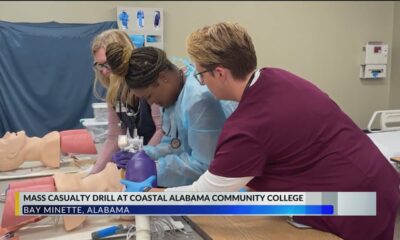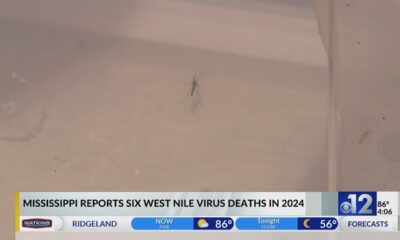Mississippi News
1 in 10 Mississippians had illegal contaminants in drinking water since 2018
1 in 10 Mississippians had illegal contaminants in drinking water since 2018
Since 2018, more than one in ten Mississippians received drinking water from their public utility that had an illegal level of contaminants in it, according to state and federal health data.
By far the most common contaminants that exceeded federal limits were disinfection byproducts, or DBPs; 29 utilities in the state, serving a combined 278,000 residents, exceeded the legal limit for those since 2018.
DBPs form when chlorine or another disinfectant used for treatment reacts with organic materials in water. But overexposure to DBPs, which are widespread across the U.S., can damage a person’s liver and nervous system, according to the CDC. They can also increase risks of cancer and affect pregnancies, says an Environmental Working Group study that published in November.
Other contaminants exceeding legal limits in the state included arsenic and radium, both of which are carcinogens. In total, Mississippi Today found 31 utilities serving 328,000 residents with contamination violations since 2018, using state health department and Environmental Protection Agency data.
Below is a map of drinking water contaminant violations found in the state:
!function(){“use strict”;window.addEventListener(“message”,(function(e){if(void 0!==e.data[“datawrapper-height”]){var t=document.querySelectorAll(“iframe”);for(var a in e.data[“datawrapper-height”])for(var r=0;r<t.length;r++){if(t[r].contentWindow===e.source)t[r].style.height=e.data["datawrapper-height"][a]+"px"}}}))}();
The EWG study — which includes a tool for users to find tap water contaminants by zip code — argues that federal limits, many of which are based on decades-old research, are not nearly strict enough; for DBPs, for example, EWG’s recommended limits are over a hundred times smaller than the EPA’s.
“We’ve taken a look at a lot of drinking water requirements, and they’re quite outdated or they’re based on outdated science,” said Tasha Stoiber, Ph.D, a scientist at EWG. “Just because your drinking water is meeting this federal legal limit, it doesn’t really mean it’s without concern.”
When asked about the contamination data, Mississippi water experts pointed to the financial hardships most utilities face, and the expensive procedures, such as reverse osmosis, required to remove DBPs. Moreover, they added that what contaminant data does exist doesn’t paint the whole picture.
Unknown scope of water contamination
Whether it’s a type of contaminant or a type of system, there are several holes in the way the state and country conducts drinking water testing, especially in rural areas.
Jason Barrett, an associate professor at Mississippi State University’s Water Resources Research Institute, analyzes testing data from private wells, where about 13% of Mississippians get their drinking water.
No testing requirements exist for those private connections, but anyone interested can pay between $10 to $20 to get their water tested at either a private lab or the state health department. Those tests, however, only look at a small fraction of the contaminants that public systems are required to check for.
Barrett said what private well data does exist is concerning, showing a coliform bacteria presence in about one-third of those connections. But that data is only a tiny glance of the reality: MSU and the Mississippi State Department of Health together test about 1,500 connections per year, which is only 1% of all the state’s private wells.
“These are people that are going out of their way, saying, ‘Hey, I don’t know what’s in my water, but I’d like to know it’s safe,’” he said. “So these are people that are curious and conscious about it, and we’re still seeing about a third of them have bacteria.
“Think about all the people that don’t really care and don’t really know to care.”
Too many utilities, not enough money
Similar to the publicized shortfall with Jackson’s water system funding, many utilities are struggling to stay up to code because of aging infrastructure and a decrease in federal funding over the last few decades.
“I think what is often lost in these conversations is that when the Clean Water Act and the Safe Drinking Water Act were enacted by Congress in the 1970s, they came with significant federal investment,” said Stephanie Showalter-Otts, director of the National Sea Grant Law Center. “It wasn’t local communities and towns and cities paying to build water treatment facilities, that money was coming from the federal government.”
Showalter-Otts works with a group at the University of Mississippi studying the presence of lead in the state’s water systems, the severity of which is unclear because of limited federal requirements and Mississippi’s lack of lead tracking.
Barrett added that financial constraints are also due to the amount of utilities in Mississippi.
“We’re in bad need of some consolidation across the state,” he said. “We’ve got way too many systems for the population. If you look at public water systems per capita, we’ve got to be leading the nation. As small as we are, less than 3 million people, and we’re sitting at over 1,100 public water supplies.”
He explained that nearby utilities can save costs by combining operations, such as building a shared well between two towns.
Rural water associations, he added, are especially handicapped because they serve such small populations, and their board has to be comprised of members from the community.
Overall, Showalter-Otts expressed the need for more testing, whether it’s for lead or for agricultural-related contaminants such as nitrogen and phosphorus. When asked about the hundreds of millions of dollars coming to Mississippi through federal legislation, she said she hopes the state will value water systems with its spending.
“I think it’s important that water be considered part of our infrastructure,” she said. “Infrastructure is more than roads and bridges, it’s also our water, wastewater and drinking water, how we move water around in our communities.”
This article first appeared on Mississippi Today and is republished here under a Creative Commons license.
Mississippi News
Ole Miss women get pair of double-doubles and roll to 83-65 March Madness win over Ball State
SUMMARY: Mississippi coach Yolett McPhee-McCuin found solace in returning to a different arena in Waco, Texas, following a disappointing previous tournament experience. The No. 5 seed Ole Miss Rebels redeemed themselves with an 83-65 victory over 12th-seeded Ball State in the NCAA Tournament’s first round. Starr Jacobs led the Rebels with 18 points and 11 rebounds, while Kennedy Todd-Williams and Madison Scott each scored 15 points. Ole Miss dominated rebounding, leading 52-32, and will face fourth-seeded Baylor next. Coach McPhee-McCuin noted the team’s evolution since their last visit and the significance of playing in Texas, where Jacobs feels at home.
The post Ole Miss women get pair of double-doubles and roll to 83-65 March Madness win over Ball State appeared first on www.wjtv.com
Mississippi News
Events happening this weekend in Mississippi: March 21-23
SUMMARY: This weekend (March 21-23), Mississippi offers a range of exciting events. Highlights include Hal’s Marching MALfunction Second Line Stomp and Jessie Robinson’s blues performance in Jackson, as well as the Natchez Food & Wine Festival and the Natchez Little Theatre’s production of *This Side of Crazy*. There are also numerous exhibitions like *Of Salt and Spirit: Black Quilters in the American South* in Jackson and *Gold in the Hills* in Vicksburg. Other events include the 48th Annual Crawfish Classic Tennis Tournament in Hattiesburg, karaoke nights in Laurel, and a variety of family-friendly activities across the state.
The post Events happening this weekend in Mississippi: March 21-23 appeared first on www.wjtv.com
Mississippi News
Events happening this weekend in Mississippi: March 14-16
SUMMARY: This weekend (March 14-16) in Mississippi offers a variety of events. In Jackson, iconic saxophonist Boney James performs at the convention center, while the JXN Food & Wine festival showcases culinary talents. The LeFleur Museum District hosts a “Week of Wonder,” and several exhibitions, including “Of Salt and Spirit,” celebrate Black quilters. Natchez features the Spring Pilgrimage tours, a reenactment of Annie Stewart’s story, and a St. Patrick’s Day celebration. In Hattiesburg, comedian Rob Schneider performs, and various events like a St. Patrick’s Day pub crawl and a talent show will take place throughout the area.
The post Events happening this weekend in Mississippi: March 14-16 appeared first on www.wjtv.com
-

 News from the South - Florida News Feed7 days ago
News from the South - Florida News Feed7 days agoFamily mourns death of 10-year-old Xavier Williams
-

 News from the South - Alabama News Feed5 days ago
News from the South - Alabama News Feed5 days agoSevere storms will impact Alabama this weekend. Damaging winds, hail, and a tornado threat are al…
-

 News from the South - Alabama News Feed5 days ago
News from the South - Alabama News Feed5 days agoUniversity of Alabama student detained by ICE moved to Louisiana
-

 News from the South - Louisiana News Feed6 days ago
News from the South - Louisiana News Feed6 days agoSeafood testers find Shreveport restaurants deceiving customers with foreign shrimp
-

 News from the South - Oklahoma News Feed3 days ago
News from the South - Oklahoma News Feed3 days agoTornado watch, severe thunderstorm warnings issued for Oklahoma
-

 News from the South - Oklahoma News Feed7 days ago
News from the South - Oklahoma News Feed7 days agoWhy are Oklahomans smelling smoke Wednesday morning?
-

 News from the South - West Virginia News Feed6 days ago
News from the South - West Virginia News Feed6 days agoRoane County Schools installing security film on windows to protect students
-

 News from the South - West Virginia News Feed7 days ago
News from the South - West Virginia News Feed7 days agoStudents in Monroe County Schools are ready to shoot their way to the WV State Archery Championships















































